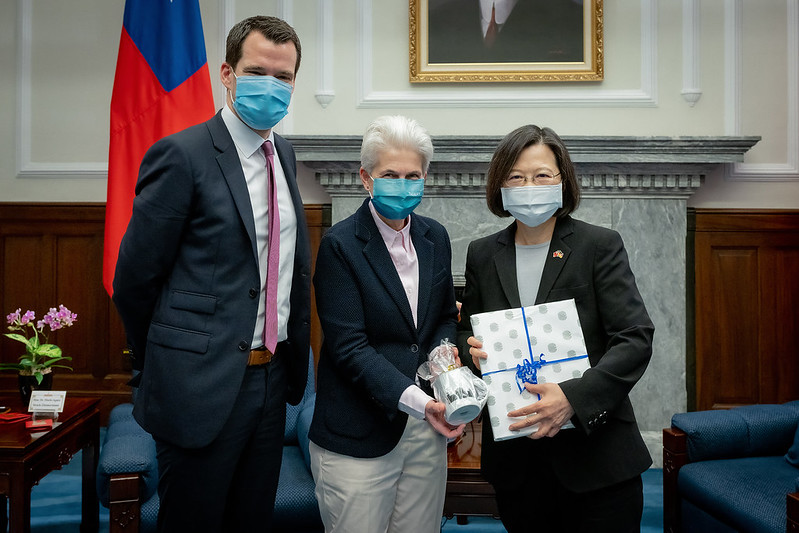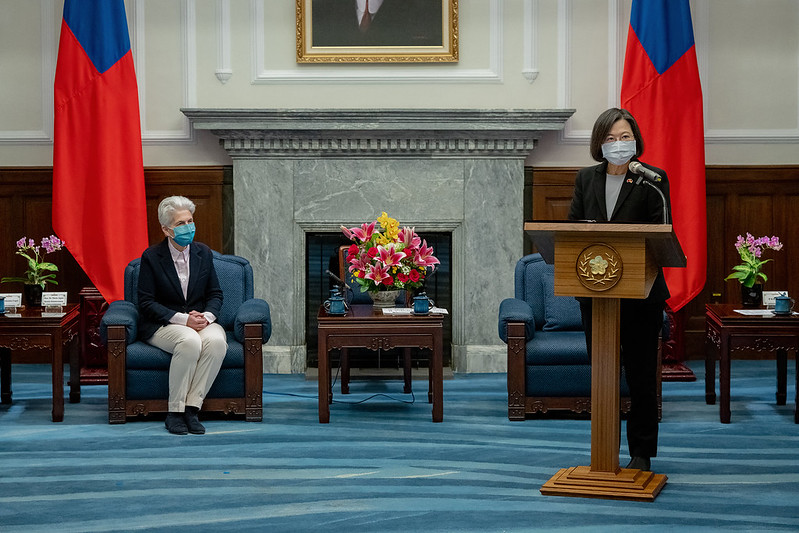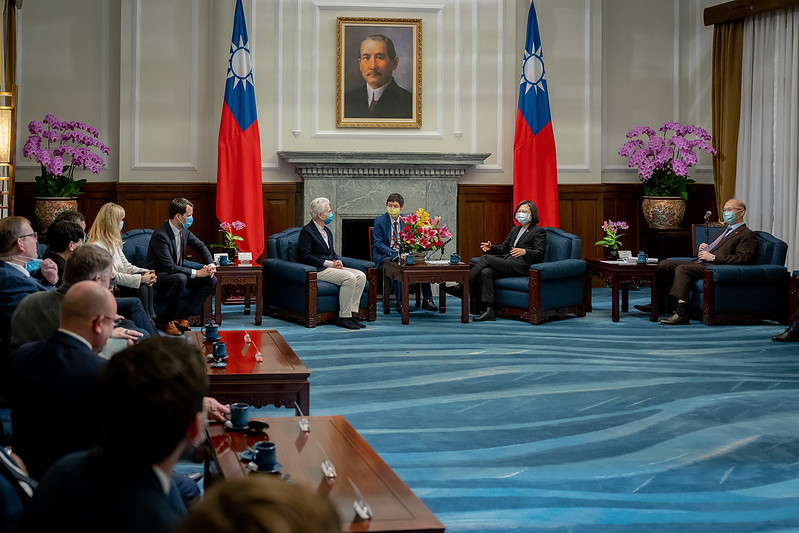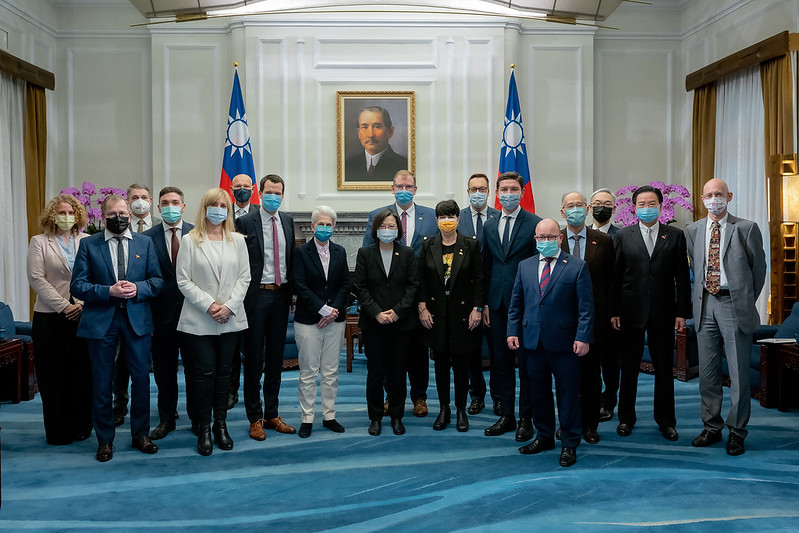News & activities
 News releases
News releases
On the morning of January 10, President Tsai Ing-wen met with a delegation of German parliamentarians from the Free Democratic Party (FDP) who sit on the Bundestag (national parliament) Defense , Foreign Affairs, and Human Rights and Humanitarian Aid committees. In remarks, President Tsai thanked Germany for recognizing the importance of and supporting Taiwan. The president said that facing authoritarian expansionism, democracies must stand together to safeguard the values of freedom and democracy, and that Taiwan looks forward to upholding regional stability and prosperity alongside Germany and other democratic partners.
A translation of President Tsai's remarks follows:
I would like to welcome this Bundestag delegation from the Defense, Foreign Affairs, and Human Rights and Humanitarian Aid committees. You are all key members of the Free Democratic Party, and your visit demonstrates your friendship with and support for Taiwan, for which I express my deepest gratitude.
In recent times, exchanges between Taiwan and Germany have grown closer. Last October, delegations from the German-Taiwan Parliamentary Friendship Group and the Committee on Human Rights and Humanitarian Aid visited Taiwan, highlighting cross-party support for Taiwan in the Bundestag. And in December, Chen Chu (陳菊), Chair of our National Human Rights Commission, led a delegation to Germany. This marked the highest-level meeting of human rights officials from our countries.
Bilateral cooperation between Taiwan and Germany is very diverse, covering such fields as energy transition, financial supervision, transitional justice, and innovation, research, and development in small- and medium-sized enterprises. I believe that, with your strong support, the partnership between Taiwan and Germany will continue to deepen.
On behalf of the people of Taiwan, I would like to take this opportunity to thank Germany for the importance it attaches to Taiwan and for its support. Last year, the Bundestag passed its first resolution in support of Taiwan's participation in the World Health Assembly as an observer. This was also the first time that over 100 Bundestag members signed a petition supporting Taiwan.
Last August, China conducted prolonged military exercises in and around the Taiwan Strait. Germany, which then held the G7 presidency, expressed the importance of maintaining peace across the Taiwan Strait in a joint statement by the G7 foreign ministers. In September, Germany mentioned Taiwan for the first time in a progress report on the implementation of its policy guidelines for the Indo-Pacific, and continues to pay close attention to security across the Taiwan Strait.
Today, facing authoritarian expansionism, democracies must stand together to safeguard the values of freedom and democracy. Starting next year, Taiwan's mandatory military service will be extended to one year. This will bolster our defense capabilities and demonstrates our determination to protect our homeland and defend democracy. We look forward to upholding regional stability and prosperity alongside Germany and other democratic partners.
I once again welcome all of you to Taiwan. In this new year, let us work together to further Taiwan-German relations.
Chairwoman of the Bundestag Defense Committee Dr. Marie-Agnes Strack-Zimmermann then delivered remarks, a transcript of which follows:
Madam President, it's really a pleasure and an honor to be here with the colleagues from the committee of defense, of foreign affairs, of human rights, and also the head of the parliamentary group of the Free Democrats. It's an honor to be here, and the reason is very simple: we are friends and we are living in a democratic way. And the world changed [on] the 24th of February; everything changed. It was not the first attack from Russia to Ukraine, but this attack was a huge wake-up call. I think not only for Europe – of course for Europe; for Germany – but also for the whole world.
And now we could see what happens in Ukraine if a despot is coming, and [it] affects the whole world. And so for us, it's very important. That's the reason why we come to your country, to your wonderful island, to say to the world that we stand close together as democratic states in case that we want to live in peace and freedom in the future for our children and grandchildren. And so it's really an honor to be here.
We have [had] wonderful talks yesterday and today. It was interesting to talk with each other. And so again, thank you very much and we are in a deep friendship here.
FDP Chair man and Chief Whip in the Bundestag Johannes Vogel then delivered remarks, a transcript of which follows:
We had the opportunity yesterday to meet parliamentarians at the Legislative Yuan from both sides, from the coalition and opposition. And we had the joy to see what a rare example the Taiwanese society is. From developing from an authoritarian society to a vital, open, and stable democracy that is able to peacefully transfer power and to exchange different positions, and we have the highest respect and admiration for that.
The German Bundestag as the German government and all Europe and Western allies support the one China policy, but we also believe that any change of the status quo in the Taiwan Strait can only be achieved by mutual agreement, and any attempt to change the status quo by force or threatening to do it by force is unacceptable. That is the position of the international community, for example laid out in the latest G7 statement and also our deep belief. And as the Free Democratic Party's parliamentary group, we take matters of freedom especially [to] our heart. That's why our visit here is also a gesture of support and solidarity against any threatening with military aggression.
And as parliamentarians, we now look forward to a fruitful exchange and again, I'm really happy to meet you.
The delegation also included members of the Bundestag Renata Alt, Konstantin Kuhle, Christine Aschenberg-Dugnus, Ulrich Lechte, Alexander Müller, Frank Müller-Rosentritt, Rainer Semet, and Nils Gründer, as well as Secretary of the Defense Committee and speaker of the delegation Cord C. Schulz. The delegation was accompanied to the Presidential Office by German Institute Taipei Director General Jorg Polster.












